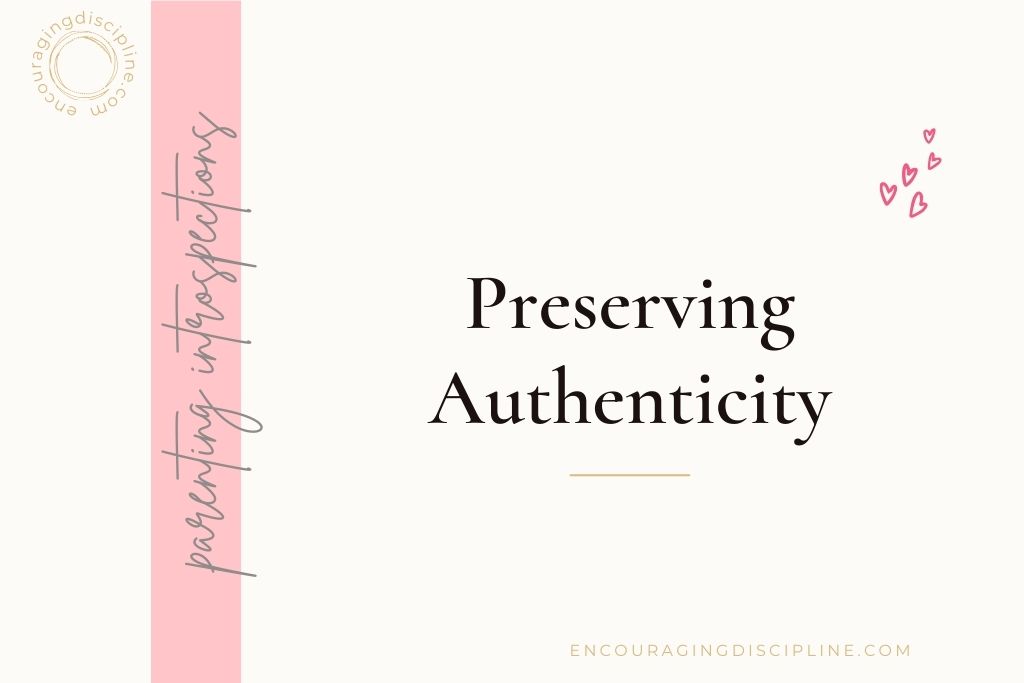Preserving Authenticity
If I asked you what traits you would want your child to develop or have as an adult, what would you say?
In fact, why don’t you stop reading here and take a few moments to think about this question? Make a list of some traits that you would like your child or children to possess as adults. And, after you’re done with your list, come back and continue reading. It should only take you a few minutes.
When I ask parents this question in person, here are some of the traits they usually write:
- honest
- responsible
- resilient
- kind
- compassionate
- confident
- capable
- dependable
- optimistic
The list goes on. You may have listed some of these too.
One of my wishes is for my children to be authentic adults, and to know who they are.
It took me decades to figure out who I am, to know myself, and to become comfortable in my own skin. It’s been a long process of stripping away all the layers that covered up who I was and coming back to my essence. Relearning to be authentic.
I wish my children could get there much sooner than I did. And not as a result of all the suffering caused by living inauthentically, but because they never strayed too far from their true self.
We are all born authentic and in touch with ourselves. Therefore, our kids are born authentic too. As such, the question isn’t how do we teach our kids to be authentic. But rather what can we do to preserve their authenticity as best as we can? What happened to us that caused us to forget who we are? And how do we avoid those traps when it comes to our children?
I’m sure you’ll agree this is a complicated matter.
When babies are born, they are always upfront about what they’re feeling. They communicate exactly what they need and they don’t worry about changing who they are to please anybody. However, as our kids grow, the way we relate to them changes and they learn that our affection does not come for free.
We withdraw attention and love when our children don’t please us or seem too “needy”. We punish them when they don’t meet our expectations or express their disappointment with our limits. We don’t accept their bids for connection in the name of building independence.
So they have to change who they are in order to get their needs met. Their needs for connection, belonging, and to be seen. They pay for our affection with their authenticity.
Although I’ve been aware of this since my daughter was born, I inevitably did things that affected her authenticity. I say “inevitably” because I believe it is impossible for any of us to always relate to others perfectly, without tainting our interactions with the flavor of conditioning that we developed. And that’s especially true when we interact with our kids. This is mostly because we’re not even aware of our baggage most of the time, and therefore it’s simply impossible to be authentic all the time.
So, as a result of my very imperfect parenting, my daughter struggles with being authentic. I see her being afraid to show her true self, always worrying about what other people are thinking.
Until recently, this felt like a huge failure on my part. And while I know that I certainly played a role in pushing my daughter away from her authentic self, now I know that that’s not the only factor in her development.
As kids grow and individuate, they try on different personas. They work on differentiating themselves from us, as they learn who they are as an individual. This can be a scary time for parents. We see our kids going away from and against our family identity. And we tend to buckle down even more.
But this is a time to trust. Trust that, once our kids find out who they are as individuals, away from us, they will come back to embrace who they are as part of our family whole.
There are many things we can do to help preserve our children’s authenticity.
1. Be authentic
One way is to work very hard at being authentic ourselves. As long as we are not aware of our feelings, thoughts, beliefs, and reactions, we are perpetuating inauthenticity and pushing our kids farther away from themselves. So getting to know our inner world, understanding our emotions, healing our triggers, and consciously managing our reactions is the first step in this process.
2. Accept who they are
Secondly, we can try to show full acceptance of our children’s emotions and the way that they experience the world. We may not feel the same way, but that doesn’t mean we have to invalidate their experience. We can accept it and be there for them.
3. Build emotional resilience
Thirdly, we can help them build skills to protect their authenticity. By expressing unconditional love to our kids and teaching them to understand their own feelings and reactions, recognize their own needs, have self-compassion and appreciation for who they are, have the courage to stand up for themselves, and build and nurture authentic relationships with people who are good for them.
Our job as parents is so big, sometimes it feels intimidating, even scary. It makes me feel humble because I realize there are so many things that I don’t know. But this is an opportunity to learn for myself all the things I want to teach my kids. We can learn together. We can grow together. And what a fantastic journey this can be!







